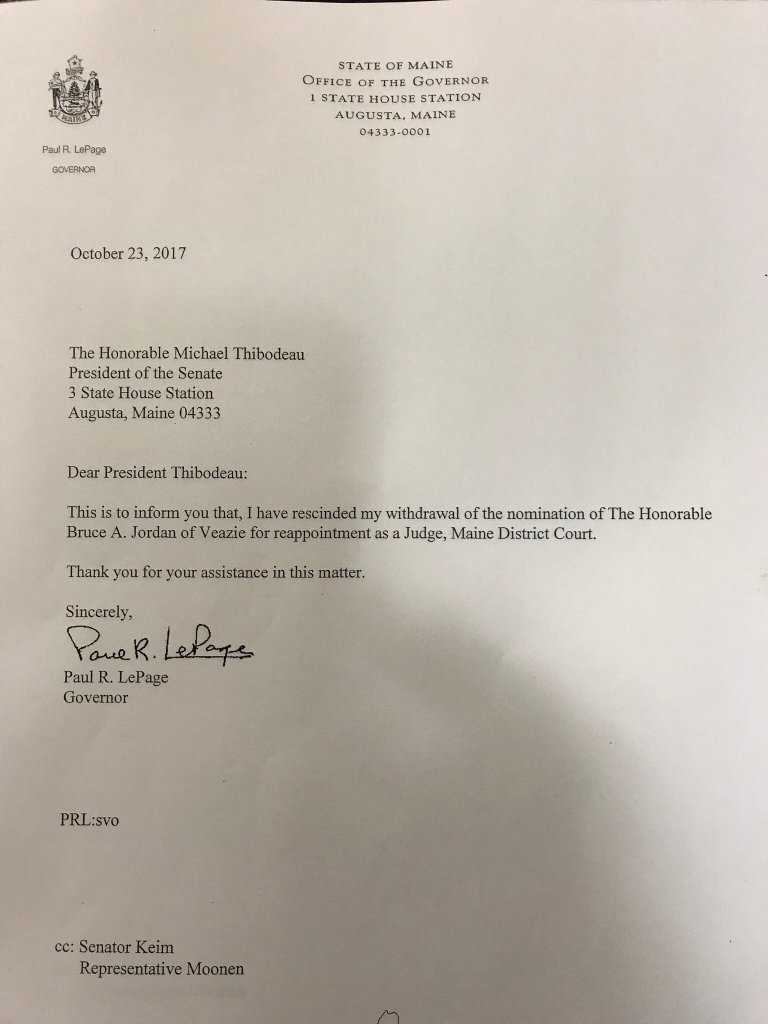AUGUSTA — Gov. Paul LePage retracted his request to withdraw the renominations of five judges Monday without providing an explanation for why he reversed course.
The Maine Senate approved all five judicial reappointments later Monday.
On Friday, LePage sent letters to legislative leaders notifying them that he was withdrawing the nominations of three Superior Court and two District Court judges. Legislative leaders received the messages Sunday – days after the Legislature’s Judiciary Committee had endorsed the reappointments and one day before a special legislative session – and were both surprised and puzzled by the action.
On Monday, LePage sent five more letters to Senate President Mike Thibodeau, R-Winterport, and other legislative leaders informing them that “I have rescinded my withdrawal of the nomination” of the five judges. The Maine Senate voted unanimously soon thereafter to confirm the reappointments of District Court Judge Bruce Jordan, District Court Judge Susan Oram, Superior Court Judge Ann Murray, Superior Court Judge MaryGay Kennedy and Superior Court Judge Robert Murray.
“All is well that ends well,” Sen. Lisa Keim, a Dixfield Republican who co-chairs the Judiciary Committee, said after the five judicial nominations were approved on votes of 34-0.
LePage’s communications office declined repeated requests Monday for comment on the nominations or to explain the reasoning behind the initial withdrawal letters and subsequent reversal.
However, a member of the Legislature’s Judiciary Committee said that Maine’s chief justice talked with the governor about the nominations.
“As I understand it, Chief Justice (Leigh) Saufley spoke with the governor at length and, as a result, he rescinded the withdrawals,” said Sen. Dawn Hill, a Cape Neddick Democrat.
A spokeswoman for the Maine Judicial Branch, Mary Ann Lynch, confirmed that Saufley spoke with LePage about the reappointments. Saufley did not respond to a request for comment on the conversation.
LePage withdrew the nominations several days after a different Superior Court judge, Michaela Murphy in Kennebec County, dismissed a lawsuit he filed seeking to force Attorney General Janet Mills’ office to pay the costs of hiring outside legal counsel when Mills declines to represent the administration. Maine’s Republican governor and Democratic attorney general have clashed on numerous policy and legal issues, including President Trump’s controversial attempts to ban immigrants from some Muslim-majority nations.
Under Maine law, District Court judges and Superior Court justices are appointed for seven-year terms and may serve an additional six months after their terms expire. The governor may withdraw judicial appointments anytime before confirmation.
All five judges were nominated in 2010 by former Gov. John Baldacci, a Democrat.
The incident added another bizarre political wrinkle to a special legislative session already stacked with controversial issues. Lawmakers on Monday voted to proceed with allowing retail sales of recreational marijuana, to change a so-called “food sovereignty” law that LePage said could cause Maine to lose its federal authority to inspect slaughterhouses on Nov. 1, and to delay the ranked-choice voting law until December of 2021 – and then repeal it if a constitutional amendment hasn’t been passed to address constitutional concerns.
Legislators said they were pleased the apparent tensions over the judicial nominations – whatever their cause – quickly dissipated on Monday.
Hill said lawmakers were determined to “calm down” any political tensions and, instead, move forward with reappointing the five judges to the bench.
“All (nominees) have been highly recommended by the governor and his staff, and they have been thoroughly vetted by the Judiciary Committee,” Hill said.
On Sunday, House Speaker Sara Gideon, D-Freeport, called LePage’s unexplained withdrawal of the five reappointments “deeply troubling.” After Monday’s events, Gideon said in a statement that she was “pleased that Gov. LePage reconsidered his withdrawal of these judicial nominations and there was a swift resolution to this matter.”
LePage has a history of withdrawing nominations, although the majority of past incidents involved individuals facing scrutiny from lawmakers during the vetting process.
In February 2016, for instance, LePage withdrew Bill Beardsley’s nomination to serve as education commissioner because he believed Democrats on the Legislature’s Education and Cultural Affairs Committee planned to reject him for political reasons. Instead, the governor kept Beardsley on as the effective head of the Department of Education but in the position of deputy commissioner.
A year earlier, LePage yanked the names of 21 people who had been nominated for various state boards and advisory councils because he was angry that lawmakers delayed a vote on his pick for the Maine Public Utilities Commission. And earlier this year, the governor rescinded a nomination to the Land for Maine’s Future board presumably because the former lawmaker would have faced strong opposition from environmental and conservation groups angered over his vote on a bill involving bonds for the program.
Kevin Miller can be contacted at 791-6312 or at:
Twitter: KevinMillerPPH
Send questions/comments to the editors.



